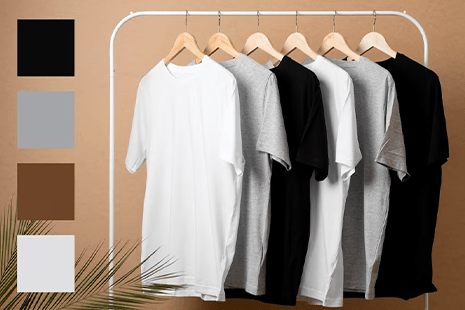A Guide to T-Shirt Fabric Types: Choosing the Right Material for You
Exploring the T-Shirt Fabric Types
- Cotton
Cotton is perhaps the most popular and versatile choice for t-shirt fabric. It’s known for its softness, breathability, and moisture-absorbing properties, making it suitable for everyday wear and various activities. Cotton t-shirts are comfortable and tend to have a casual look, perfect for lounging or running errands. However, keep in mind that pure cotton shirts can wrinkle easily and may shrink after washing.
- Supima Cotton
Supima cotton is a premium variation of cotton known for its exceptional quality. It’s made from extra-long staple fibers, resulting in a softer and more durable fabric. Supima cotton t-shirts retain their shape well and have a luxurious feel against the skin. While they might be pricier than regular cotton options, their longevity and comfort make them a worthwhile investment.
- Bamboo
Bamboo t-shirts are gaining popularity due to their eco-friendly properties. Bamboo fabric is naturally hypoallergenic, moisture-wicking, and breathable, making it an excellent choice for those with sensitive skin. Additionally, bamboo has natural antimicrobial properties that can help keep your t-shirt fresh for longer periods between washes.
- Polyester
It is known that polyester t-shirts are durable and resist wrinkles, shrinking, and fading. They are also moisture-wicking and quick-drying, making them suitable for workouts and outdoor activities. However, some people find that polyester can feel less comfortable against the skin compared to natural fibers like cotton.
- Blends
T-shirt blends combine different fabrics to create a balance of their respective properties. For instance, a cotton-polyester blend combines the comfort of cotton with the durability of polyester. These blends can offer the best of both worlds, catering to various needs without compromising too much on comfort or functionality.
- Tri-Blend
Tri-blend t-shirts usually consist of a mix of cotton, polyester, and rayon. This combination creates a fabric that is incredibly soft, lightweight, and has a vintage appearance. Tri-blend shirts often have a slightly faded or heathered look, which adds to their aesthetic appeal.
- Rayon
Rayon is a semi-synthetic fabric that is often blended with other materials to create a soft and smooth texture. It drapes well and has a luxurious feel, making it a great choice for t-shirts with a more elegant or flowy design. However, rayon can be more delicate and may require extra care during washing.
- Hemp
Hemp t-shirts are known for their durability and environmentally friendly production process. Hemp fibers become softer with each wash, resulting in a comfortable and unique feel over time. Additionally, hemp is naturally resistant to UV rays and has antimicrobial properties.
- Organic Cotton
Cotton grown organically does not contain any synthetic pesticides or fertilizers. T-shirts made from organic cotton are not only gentler on the environment but also on your skin. They offer the same comfort and breathability as conventional cotton but with the added benefit of supporting sustainable farming practices.
- Modal
Pulp from beech trees is used to manufacture Modal rayon. It’s incredibly soft, lightweight, and has excellent moisture-wicking properties. Modal t-shirts are comfortable to wear and have a luxurious sheen, making them a popular choice for both casual and slightly dressier occasions.
Selecting the right t-shirt fabric type depends on your personal preferences, intended use, and values. Whether you prioritize comfort, durability, sustainability, or a combination of factors, there’s a fabric out there to suit your needs. Keep this guide in mind the next time you’re shopping for t-shirts, and you’ll be well-equipped to make an informed decision that enhances your wearing experience.


